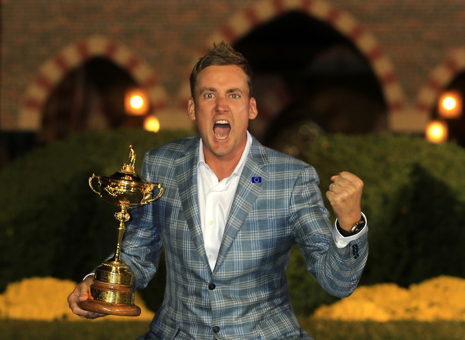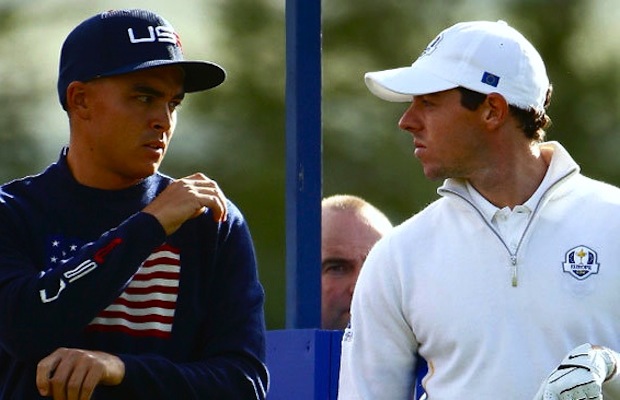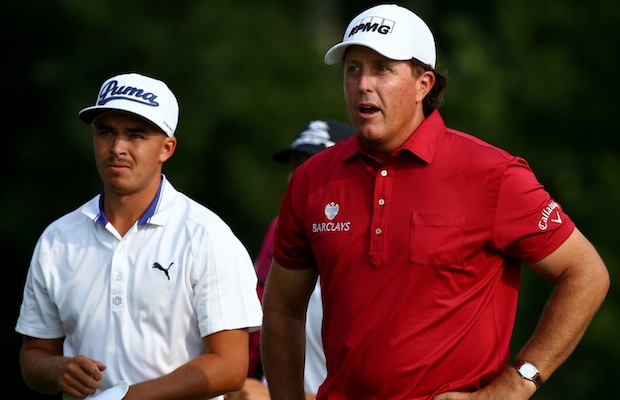Opinion & Analysis
“When you think you can’t, think of Ian Poulter”

By Tony Clark
GolfWRX Contributor
Tony Clark is a former professional golfer and CEO of Clark Management Group, owners of the PlaneSWING Golf Training System. Tony divides his time between his businesses in England and Windermere, Fla.
I’ve met Ian Poulter, albeit briefly, as a result of being a member at Woburn where he is the playing professional and ambassador.
The aura of confidence and single-mindedness he displays means Ian might not appeal to everyone but I like him.
That opinion is shaped by my limited knowledge of his background, the work I know he does for junior golf and charities and conversations I’ve had with people that know him far better than me.
By contrast, I’ve also endured BS about Ian from people who display nothing but envy. You know who you are!
Poulter is 36-years-old. He turned professional 20 years ago when his handicap was four and he was a good club golfer but, arguably, nothing special.
But Poulter had a dream: to make a success of his life and prove his teachers wrong.
“All my life I’ve been told I’d never amount to anything,” he said. “That was always the message from my teachers at school. I wanted to be a footballer but that didn’t work out either. But, yeah, I just love proving people wrong. It gives me the motivation to succeed.”
Teachers take note — you make or break our leaders of tomorrow.
With no amateur career to speak of Poulter pursued his dream of being a successful tour pro. He was an assistant professional at Chesfield Downs, a modest club where, it seems, he received little encouragement.
I’m sure Poulter’s self-belief wasn’t unshakable — we all have bad days. But it was undoubtedly stronger than most – as he has proved so spectacularly.
Now, when kids and adults alike look at Poulter, what do they see?
That’s for them to answer. What I see is a self-made man in the truest sense of the word.
Not only has Poulter worked his butt off to get his game to a level where he competes with the best in one of the most competitive sports in the world, he’s done so with a metaphorical foot on his head trying to keep him down.
His persona is not an accident in my view. He’s made some excellent strategic marketing decisions that ensure he remains at the forefront of golfing news.
People ridiculed the remark he made about his ability (there’s that collective metaphorical foot again) when he told Golf World (UK) in March 2008:
“Don’t get me wrong, I really respect every professional golfer, but I know I haven’t played to my full potential and when that happens, it will be just me and Tiger.”
Was it hype or did he mean it? I hope it was both!
So after 12 years we’ve seen Poulter the golfer, marketer and, through his junior golf and charitable works, the philanthropist.
Always a snappy and trendy dresser, Poulter created IJP Design several years ago and launched a clothing range every bit as controversial, and to a great extent retro, as he is. Enter Poulter the entrepreneur.
All of which makes him appear a magical blend of Doug Sanders, Richard Branson, Donald Trump and Paul Getty.
Add to this the fact that Poulter actually has a wonderful family, spending as much time as he can with his wife and their FOUR children. Enter Ian Poulter the family man.
Undoubtedly, Poulter has a great team around him. No one person could manage everything that goes on his life. So we can now add ‘time management’ and ‘delegation’ to his skill set. Stand up Ian Poulter the CEO!
Furthermore, while Poulter was one of Europe’s 12 sporting heroes in the Ryder Cup at Medinah, he was acknowledged by his teammates as the Leader — someone who thrives on pressure; the aggressive home supporters unwittingly his driving force. Someone should have warned them not to put a metaphorical foot on his head!
So when you think you can’t, think of Ian Poulter.
Opinion & Analysis
The 2 primary challenges golf equipment companies face

As the editor-in-chief of this website and an observer of the GolfWRX forums and other online golf equipment discourse for over a decade, I’m pretty well attuned to the grunts and grumbles of a significant portion of the golf equipment purchasing spectrum. And before you accuse me of lording above all in some digital ivory tower, I’d like to offer that I worked at golf courses (public and private) for years prior to picking up my pen, so I’m well-versed in the non-degenerate golf equipment consumers out there. I touched (green)grass (retail)!
Complaints about the ills of and related to the OEMs usually follow some version of: Product cycles are too short for real innovation, tour equipment isn’t the same as retail (which is largely not true, by the way), too much is invested in marketing and not enough in R&D, top staffer X hasn’t even put the new driver in play, so it’s obviously not superior to the previous generation, prices are too high, and on and on.
Without digging into the merits of any of these claims, which I believe are mostly red herrings, I’d like to bring into view of our rangefinder what I believe to be the two primary difficulties golf equipment companies face.
One: As Terry Koehler, back when he was the CEO of Ben Hogan, told me at the time of the Ft Worth irons launch, if you can’t regularly hit the golf ball in a coin-sized area in the middle of the face, there’s not a ton that iron technology can do for you. Now, this is less true now with respect to irons than when he said it, and is less and less true by degrees as the clubs get larger (utilities, fairways, hybrids, drivers), but there remains a great deal of golf equipment truth in that statement. Think about it — which is to say, in TL;DR fashion, get lessons from a qualified instructor who will teach you about the fundamentals of repeatable impact and how the golf swing works, not just offer band-aid fixes. If you can’t repeatably deliver the golf club to the golf ball in something resembling the manner it was designed for, how can you expect to be getting the most out of the club — put another way, the maximum value from your investment?
Similarly, game improvement equipment can only improve your game if you game it. In other words, get fit for the clubs you ought to be playing rather than filling the bag with the ones you wish you could hit or used to be able to hit. Of course, don’t do this if you don’t care about performance and just want to hit a forged blade while playing off an 18 handicap. That’s absolutely fine. There were plenty of members in clubs back in the day playing Hogan Apex or Mizuno MP-32 irons who had no business doing so from a ballstriking standpoint, but they enjoyed their look, feel, and complementary qualities to their Gatsby hats and cashmere sweaters. Do what brings you a measure of joy in this maddening game.
Now, the second issue. This is not a plea for non-conforming equipment; rather, it is a statement of fact. USGA/R&A limits on every facet of golf equipment are detrimental to golf equipment manufacturers. Sure, you know this, but do you think about it as it applies to almost every element of equipment? A 500cc driver would be inherently more forgiving than a 460cc, as one with a COR measurement in excess of 0.83. 50-inch shafts. Box grooves. And on and on.
Would fewer regulations be objectively bad for the game? Would this erode its soul? Fortunately, that’s beside the point of this exercise, which is merely to point out the facts. The fact, in this case, is that equipment restrictions and regulations are the slaughterbench of an abundance of innovation in the golf equipment space. Is this for the best? Well, now I’ve asked the question twice and might as well give a partial response, I guess my answer to that would be, “It depends on what type of golf you’re playing and who you’re playing it with.”
For my part, I don’t mind embarrassing myself with vintage blades and persimmons chasing after the quasi-spiritual elevation of a well-struck shot, but that’s just me. Plenty of folks don’t give a damn if their grooves are conforming. Plenty of folks think the folks in Liberty Corner ought to add a prison to the museum for such offences. And those are just a few of the considerations for the amateur game — which doesn’t get inside the gallery ropes of the pro game…
Different strokes in the game of golf, in my humble opinion.
Anyway, I believe equipment company engineers are genuinely trying to build better equipment year over year. The marketing departments are trying to find ways to make this equipment appeal to the broadest segment of the golf market possible. All of this against (1) the backdrop of — at least for now — firm product cycles. And golfers who, with their ~15 average handicap (men), for the most part, are not striping the golf ball like Tiger in his prime and seem to have less and less time year over year to practice and improve. (2) Regulations that massively restrict what they’re able to do…
That’s the landscape as I see it and the real headwinds for golf equipment companies. No doubt, there’s more I haven’t considered, but I think the previous is a better — and better faith — point of departure when formulating any serious commentary on the golf equipment world than some of the more cynical and conspiratorial takes I hear.
Agree? Disagree? Think I’m worthy of an Adam Hadwin-esque security guard tackle? Let me know in the comments.
@golfoncbs The infamous Adam Hadwin tackle ? #golf #fyp #canada #pgatour #adamhadwin ? Ghibli-style nostalgic waltz – MaSssuguMusic
Podcasts
Fore Love of Golf: Introducing a new club concept

Episode #16 brings us Cliff McKinney. Cliff is the founder of Old Charlie Golf Club, a new club, and concept, to be built in the Florida panhandle. The model is quite interesting and aims to make great, private golf more affordable. We hope you enjoy the show!
Opinion & Analysis
On Scottie Scheffler wondering ‘What’s the point of winning?’

Last week, I came across a reel from BBC Sport on Instagram featuring Scottie Scheffler speaking to the media ahead of The Open at Royal Portrush. In it, he shared that he often wonders what the point is of wanting to win tournaments so badly — especially when he knows, deep down, that it doesn’t lead to a truly fulfilling life.
View this post on Instagram
“Is it great to be able to win tournaments and to accomplish the things I have in the game of golf? Yeah, it brings tears to my eyes just to think about it because I’ve literally worked my entire life to be good at this sport,” Scheffler said. “To have that kind of sense of accomplishment, I think, is a pretty cool feeling. To get to live out your dreams is very special, but at the end of the day, I’m not out here to inspire the next generation of golfers. I’m not out here to inspire someone to be the best player in the world, because what’s the point?”
Ironically — or perhaps perfectly — he went on to win the claret jug.
That question — what’s the point of winning? — cuts straight to the heart of the human journey.
As someone who’s spent over two decades in the trenches of professional golf, and in deep study of the mental, emotional, and spiritual dimensions of the game, I see Scottie’s inner conflict as a sign of soul evolution in motion.
I came to golf late. I wasn’t a junior standout or college All-American. At 27, I left a steady corporate job to see if I could be on the PGA Tour starting as a 14-handicap, average-length hitter. Over the years, my journey has been defined less by trophies and more by the relentless effort to navigate the deeply inequitable and gated system of professional golf — an effort that ultimately turned inward and helped me evolve as both a golfer and a person.
One perspective that helped me make sense of this inner dissonance around competition and our culture’s tendency to overvalue winning is the idea of soul evolution.
The University of Virginia’s Division of Perceptual Studies has done extensive research on reincarnation, and Netflix’s Surviving Death (Episode 6) explores the topic, too. Whether you take it literally or metaphorically, the idea that we’re on a long arc of growth — from beginner to sage elder — offers a profound perspective.
If you accept the premise literally, then terms like “young soul” and “old soul” start to hold meaning. However, even if we set the word “soul” aside, it’s easy to see that different levels of life experience produce different worldviews.
Newer souls — or people in earlier stages of their development — may be curious and kind but still lack discernment or depth. There is a naivety, and they don’t yet question as deeply, tending to see things in black and white, partly because certainty feels safer than confronting the unknown.
As we gain more experience, we begin to experiment. We test limits. We chase extreme external goals — sometimes at the expense of health, relationships, or inner peace — still operating from hunger, ambition, and the fragility of the ego.
It’s a necessary stage, but often a turbulent and unfulfilling one.
David Duval fell off the map after reaching World No. 1. Bubba Watson had his own “Is this it?” moment with his caddie, Ted Scott, after winning the Masters.
In Aaron Rodgers: Enigma, reflecting on his 2011 Super Bowl win, Rodgers said:
“Now I’ve accomplished the only thing that I really, really wanted to do in my life. Now what? I was like, ‘Did I aim at the wrong thing? Did I spend too much time thinking about stuff that ultimately doesn’t give you true happiness?’”
Jim Carrey once said, “I think everybody should get rich and famous and do everything they ever dreamed of so they can see that it’s not the answer.”
Eventually, though, something shifts.
We begin to see in shades of gray. Winning, dominating, accumulating—these pursuits lose their shine. The rewards feel more fleeting. Living in a constant state of fight-or-flight makes us feel alive, yes, but not happy and joyful.
Compassion begins to replace ambition. Love, presence, and gratitude become more fulfilling than status, profits, or trophies. We crave balance over burnout. Collaboration over competition. Meaning over metrics.
Interestingly, if we zoom out, we can apply this same model to nations and cultures. Countries, like people, have a collective “soul stage” made up of the individuals within them.
Take the United States, for example. I’d place it as a mid-level soul: highly competitive and deeply driven, but still learning emotional maturity. Still uncomfortable with nuance. Still believing that more is always better. Despite its global wins, the U.S. currently ranks just 23rd in happiness (as of 2025). You might liken it to a gifted teenager—bold, eager, and ambitious, but angsty and still figuring out how to live well and in balance. As much as a parent wants to protect their child, sometimes the child has to make their own mistakes to truly grow.
So when Scottie Scheffler wonders what the point of winning is, I don’t see someone losing strength.
I see someone evolving.
He’s beginning to look beyond the leaderboard. Beyond metrics of success that carry a lower vibration. And yet, in a poetic twist, Scheffler did go on to win The Open. But that only reinforces the point: even at the pinnacle, the question remains. And if more of us in the golf and sports world — and in U.S. culture at large — started asking similar questions, we might discover that the more meaningful trophy isn’t about accumulating or beating others at all costs.
It’s about awakening and evolving to something more than winning could ever promise.





















Roger in NZ
Oct 6, 2012 at 11:50 am
Great article about a great guy.
Thanks to Tony Clark for pointing out not just Golf successes, but retro style!, family and Philanthropy. And the power of Delegation and Self Belief ! Michael G, so many of those whining 8 year olds sell the goods on Ebay a day later…………
Tony Clark
Aug 20, 2014 at 5:25 am
Hi Roger, After a spectator caught Rory’s ball at the 72nd hole of The Open Championship and then sold it on eBay for $30k, I immediately recalled your comment above. Spot on. Haha! Hope you’re well.
Mark I
Oct 5, 2012 at 11:10 pm
if you judged every golfer (or elite athlete from ANY sport for that Matter) on whether they have not signed an autograph for someone before, Im afraid you would be sadly dissapointed, and find that signing a “black hat” does not define a person or make them a fraud.
Johnny K
Oct 5, 2012 at 11:12 pm
Agreed
Michael G.
Oct 4, 2012 at 12:32 pm
Gutsy performance, but this guy is a turd. I watched him literally walk past an 8 year old autograph TWICE at the Barclays a few years back because the hat he was being asked to sign was black. The kid didn’t care, and was crestfallen when this idiot walked past him a second time. A complete fraud…
Stuart
Oct 4, 2012 at 5:04 am
Congratulations on a truly great article. Ian deserves to be celebrated. He does it time and time again mostly when the pressure is at it’s most intense. I remember in Wales Monty was criticized for picking him and he went on to be the highest points winner that year too. In fact one of the most memorable momenst of the 2010 Ryder Cup was when the crowd sang there’s only two Molinaris and the reason they sang that was because 5 minutes earlier the crowd was acknowledging that there is only one Ian Poulter. I will indeed think of Ian if I ever doubt that I can achieve anything.